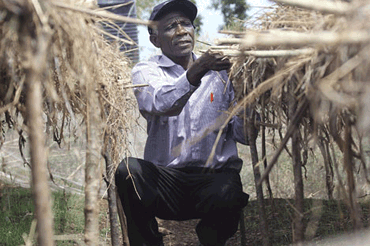- by AATF Africa
Tormented by unreliable rains and the destructive Striga weed, he was ready to try any crop that came his way. “When you are sick and you don’t know what ails you, you will take any concoction hoping that one of them will eventually cure you. In farming that is what I had been doing for quite a long time.”
But this was before he encountered agricultural extension services during a field day facilitated by the African Agricultural Technology Foundation (AATF) in Homabay Town two planting seasons ago. They introduced him to new ideas such as soil testing, planting appropriate crops, and the use of certified seeds and fertilizer.
He also got to learn about the Imazapyr Resistant (IR) seeds, popularly known as the StrigAway or Ua Kayongotechnology that is changing fortunes in the Lake Victoria region. He was told that Striga survives by siphoning off water and nutrients from the host crops for its own growth. It can reduce output by 80%.
The AATF – established in 2003 to help small-holder farmers in Sub-Saharan Africa improve farming in order to fight hunger and poverty – has partnered with four commercial seed companies to make available the IR seeds to farmers. Its Striga Control in Maize Project also trains its beneficiaries in better farming practices.
“Even though we knew they (extension officers) were experts, there were so many questions as to their motive. Some farmers just laughed off a suggestion that if they prepared the fields properly, used the right seeds and used fertilizers, their harvest would multiply ten times. It is a language they never heard before.”
His farm was among those hitherto heavily ravaged by the Striga. In fact when he was approached to be part of the demonstration group whose farms would be used as exhibition sites, he gave them a parcel he had long abandoned due to its low yields.
To his surprise, even his most fertile land did not produce half of what he eventually got from the demonstration plot he had up till then neglected – the parcel he had abandoned.
“I managed (140 kilos) from the demo plot yet only a few buckets from the one I planted the kienyeji (seeds recycled from previous harvest)”, he recalls.
Ignorance is a key contributor to food insecurity in Kenya, according to Awino. “Many people have been growing maize for a long time and their choice of seeds is usually informed by what they see others plant. They don’t seek expert advice. And it takes time for them to accept latest technologies.”
Samuel is now a delighted man. He no longer depends on the hand-of-fate to give him a bumper crop. The StrigAwayseeds came in handy. He can now afford food for his family even as he handily pays school fees for those who depend on him.



















































































